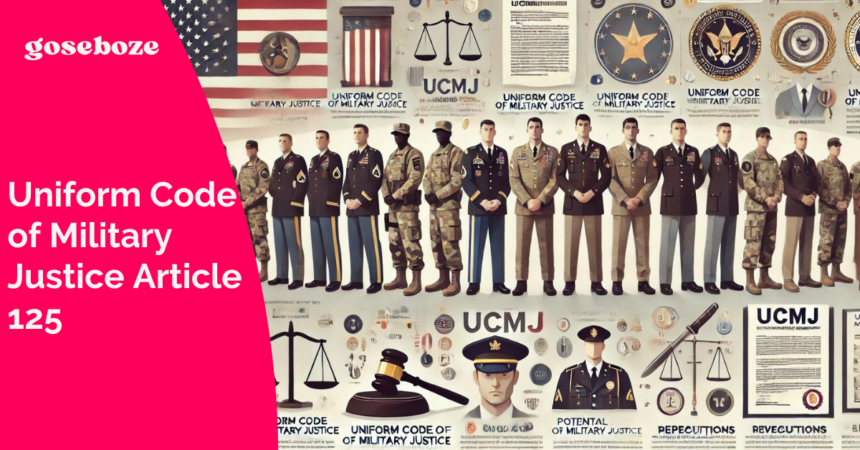Did you know that the Uniform Code of Military Justice (UCMJ) plays a significant role in the lives of the members of the United States Armed Forces? Members of the military are subject to certain conduct and a specific set of laws created just for them. If a military personnel violates the UCMJ, he or she can face severe repercussions.
Among many provisions under UCMJ, Article 125 is a sensitive topic. UCMJ Article 125 refers to sodomy, which is defined by the UCMJ as “unnatural carnal copulation.”
Any person who engages in unnatural carnal copulation with another person of the same or opposite sex or with an animal is guilty of sodomy. No matter how slight, penetration is enough to complete the offense.
A military personnel who is charged with UCMJ Article 125 can experience distress and humiliation. When convicted, he may lose his rank, be discharged from military service, and pay fines. Let’s understand what UCMJ Article 125 really is about.
Historical Background of Article 125
Article 125 of the Uniform Code of Military Justice (UCMJ) traces its historical background back to the early 20th century. It was included in the UCMJ in 1950, criminalizing certain acts of sodomy within the military. The provision was influenced by societal norms and moral values prevalent at that time, aiming to maintain discipline and uphold moral standards within the armed forces.
During the early 20th century, there was a huge emphasis on regulating the behavior of military personnel, both on and off-duty. The inclusion of Article 125 reflected the military’s commitment to enforcing strict codes of conduct among its members. This historical context explicates the origins of Article 125 and helps understand the rationale behind its inclusion in the UCMJ.
The historical background of Article 125 provides insight into the evolution of military law and the shifting attitudes towards certain behaviors within the armed forces. While societal views have progressed over the years, the historical roots of Article 125 remain embedded in the UCMJ, shaping the legal aspect that governs military personnel.
Read Also: Protecting Your Career: How an Employment Lawyer Can Help
Definition and Scope of Sodomy
Sodomy is defined as engaging in certain sexual acts that are considered unlawful under military law. These acts include oral or anal sex between persons or any form of unnatural carnal copulation. It’s important to note that the definition of sodomy can vary between jurisdictions, so it’s necessary to understand how it’s specifically defined under the Uniform Code of Military Justice (UCMJ).
The scope of sodomy under Article 125 of the UCMJ encompasses a range of sexual activities deemed inappropriate within the military context. This includes not only consensual acts but also non-consensual or coercive sexual conduct. The UCMJ sets forth clear guidelines on what constitutes sodomy and provides a framework for prosecuting individuals who engage in such behavior.
The boundaries set by Article 125 play a big role for all military personnel to guarantee their compliance with military regulations. Violating the provisions outlined in this article can have serious consequences, so it’s important to be aware of what actions constitute sodomy under military law.
Punishments and Consequences for Violation
Breaking the boundaries set by UCMJ Article 125 can result in severe punishments and consequences for military personnel. Violating Article 125, which prohibits sodomy, can lead to serious repercussions such as dishonorable discharge, reduction in rank, forfeiture of pay, and confinement.
These punishments are designed to uphold discipline and maintain the integrity of the military. A conviction under Article 125 can have long-lasting effects on a service member’s career and personal life.
Aside from the official penalties, individuals found guilty of sodomy may also face societal stigma and damage to their reputation within the military community. Military personnel must understand and adhere to the regulations outlined in Article 125 to avoid facing these harsh consequences.
Challenges and Controversies Surrounding Article 125
Violating the regulations outlined in UCMJ Article 125 can give rise to various challenges and controversies within the military community. One of the primary challenges is determining consent in cases involving sexual acts. This issue becomes more complicated when considering power dynamics within the military hierarchy.
There’s also often controversy surrounding the perceived fairness of the punishment meted out for violations of Article 125. Some argue that the penalties are too severe, while others believe they aren’t tough enough to deter such behavior effectively.
It’s also challenging to guarantee that victims feel comfortable reporting incidents of sexual misconduct. Fear of retaliation or damage to one’s military career can prevent individuals from coming forward, leading to underreporting and a lack of accountability. This poses a challenge to creating a safe and respectful environment within the military.
Addressing these challenges and controversies surrounding Article 125 requires a comprehensive approach that prioritizes the well-being and safety of all military personnel while upholding justice and discipline.
Recent Updates and Reforms in Enforcement
Recent updates and reforms in the enforcement of UCMJ Article 125 have aimed to enhance accountability and improve the handling of cases involving sexual misconduct within the military. These changes reflect a commitment to ensuring justice and addressing the challenges surrounding sexual offenses in the armed forces.
One important reform is the emphasis on providing better support for survivors and streamlining the reporting process to encourage more individuals to come forward without fear of retaliation.
Increasing training for military personnel at all levels has also been a focus to prevent sexual misconduct and create a culture of respect and professionalism. Efforts to strengthen investigative procedures have also been conducted to make sure that cases are handled promptly and fairly.
The military justice system seeks to hold perpetrators accountable while safeguarding the rights of victims through the implementation of these updates. It’s necessary for all members of the military to be aware of these changes and actively contribute to creating a safer and more equitable environment for all service members.
Conclusion
It is very important for military personnel to study and understand the Uniform Code of Military Justice Article 125, including the definition and consequences of sodomy, as well as the potential punishments for violation.
Stay informed and comply with the regulations to avoid any legal issues in the military.








